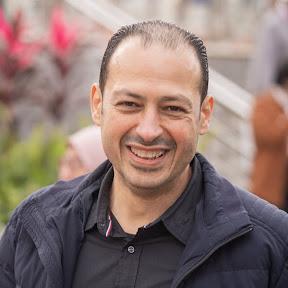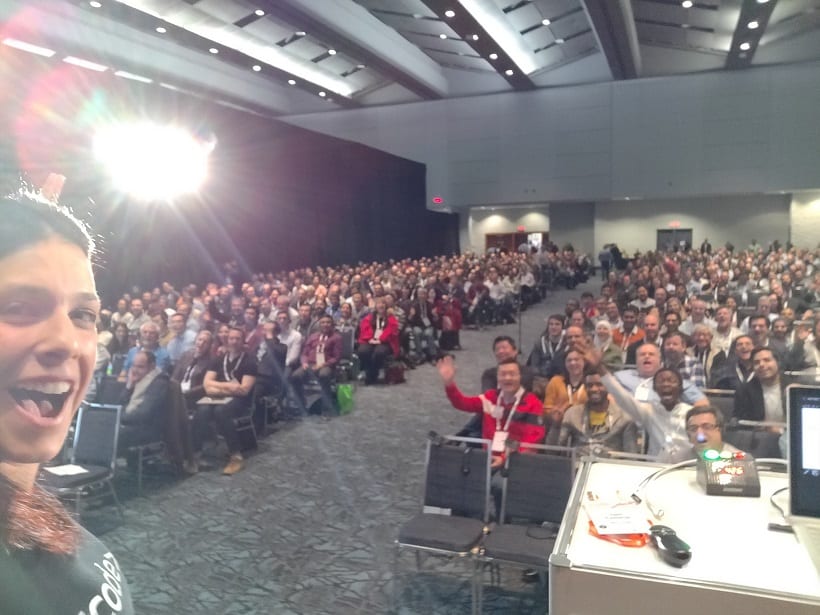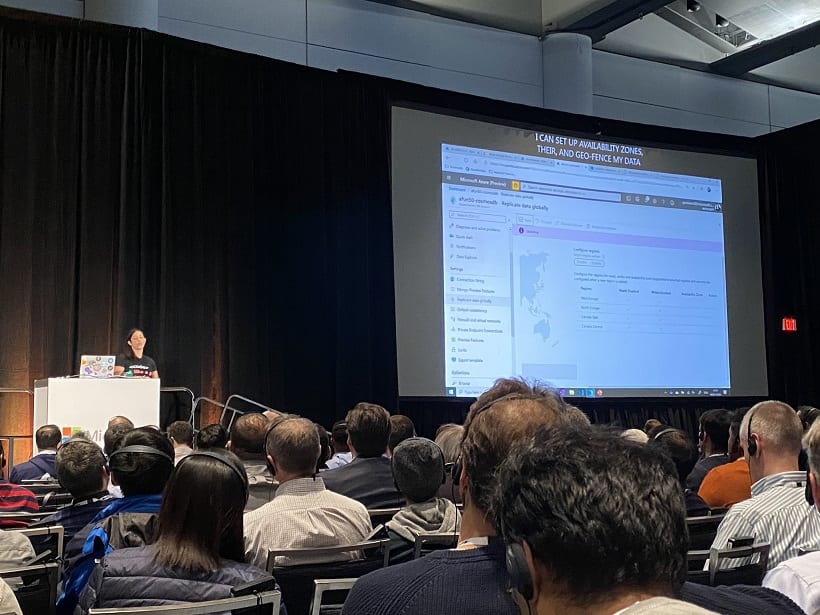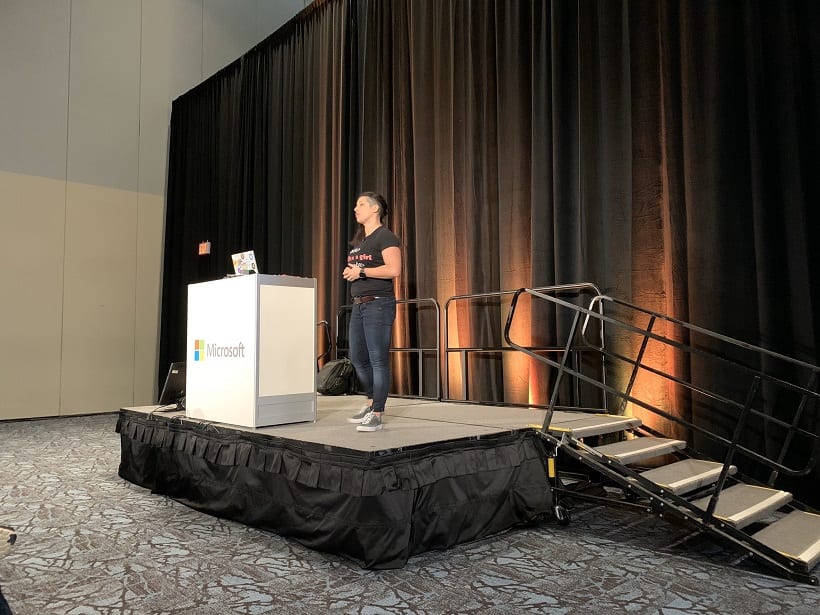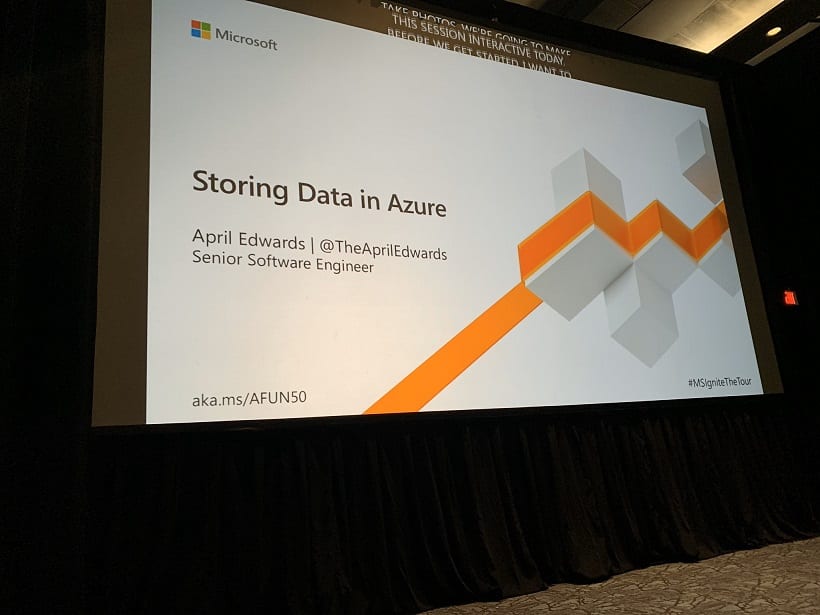Interview with April Edwards, a Senior Software Engineer / Cloud Advocate at Microsoft during Microsoft Ignite The Tour in London.
The following video has the complete interview:
Intro
Welcome to community interview episode (2).
Our community interview is all about Standing on the shoulders of giants! This is a metaphor which means “Using the understanding gained by major thinkers who have gone before in order to make intellectual progress”.
So, our giant in this episode is April Edwards, who is working as a Senior Software Engineer / Cloud Advocate at Microsoft. April is a very specialized Engineer in Azure and DevOps and she has delivered many amazing sessions and talks all over the globe. A few insights from April’s sessions:
It was a very energetic and amazing interview. I got inspired and I am sure you will get inspired too! Here is the interview:
Mohamed: Hello everyone! We are here at Microsoft Ignite The Tour in London and I have here April Edwards with me. Hello April!
April: Hello Mohammed, how are you?
Mohamed: I’m fine, it’s really great to have you here. So, first, let me start by asking you to have an introduction about yourself, what are you doing? Where are you based?
April: I’m actually based in the UK and I work for our Commercial Software Engineering team. I’m a senior software engineer and also a cloud advocate for Azure as well.
Mohamed: That’s great, can you give us an introduction about the topics you are presenting in this event?
April: On the tour, I get to present multiple different topics. Today’s topic is about storing your data in Azure. So, that’s going to cover the basics like actually how storage works, some benefits, use cases for it but also things like databases as well and all those things that we can kind of deploy to. The other topic I’m going to cover is more DevOps focused, so things like Azure Pipelines and A/B testing as well. Those are sessions tomorrow, so I’m covering a wide breadth of technologies.
Mohamed: That’s great, talking about pipeline and A/B testing, why is it important to embrace that technology or these practices?
April: Most of our customers, whether they are on-premises or in the cloud, are looking to be more Agile organizations. They might be working with waterfall methodology or monolithic applications, and when they start looking at the cloud, they start thinking how do we become more Agile, how do we do it right, what’s the best practice. Whether you’re on-premises or in the cloud, we have great tools at Microsoft that help you achieve that. Looking at pipelines and Continuous Integration Continuous Delivery, it starts opening up all the possibilities for organizations and making them more Agile.
The big thing about DevOps is it’s about development teams and operation teams, and what we want to do is start bringing them together to deliver value to our customers and their customers. What is that value? It’s not just code anymore, we need an infrastructure to run on, we need to automate that. So, I work with a lot of organizations and Ops teams talking about infrastructure as code using things like Terraform and ARM Templates. Then we talk to the Dev teams about how they deploy their code and making small code changes and making them more Agile. The DevOps topic is massive, and it includes every part of an organization and not just your Dev team and your Ops team. We are really trying to break down those barriers, and make those customers really embrace the cloud and really love what they do, make their jobs more efficient. No one likes 3:00 AM calls, right! That’s exactly why we start talking about those technologies.
Mohamed: So, what are we expecting in the future in this area? How do you see that?
April: It’s always evolving, DevOps is continuously evolving. We always talk to customers and ask what’s the Definition of Done? But the definition of done might be in a sprint cycle or in a small piece of a project, it’s constantly evolving. What does this look like for the future? We’re still working with customers that are still trying to figure out how to work in an Agile methodology, and we’re a very Agile organization within Microsoft as well and we had to figure it out. So, I think it’s constantly evolving, there’s no real end game, and I think as more customers have hybrid environments and multiple cloud environments, it’s constantly changing the game and I think the biggest thing we see is automation.
I work with a lot of Ops teams, they’re going like, I’m a storage expert or I manage infrastructure, am I going to be out of a job? The reality is they’re not, when you go to Azure, you’re consuming infrastructure as a service and data become a hot topic. So, not just maybe the storage and maybe the nuts and bolts and where you plug in cables but you’re more proactive, so, we see people being more proactive in their organizations and then we start automating. So, your infrastructure teams need to look at how they automate their builds, how do they deploy faster, and the Dev teams are working that same kind of methodology, they want the infrastructure to be deployed and the Ops team are going, oh we’re out of resources on-prem. So, what do we do? So, we start looking at automation from both sides of the fence.
Mohamed: That’s great, how do you see cloud computing in the past, present and in the future in terms of adoption and also for development response to business in the market?
April: I think, when Azure first came many years ago, it was called Windows Azure. So, everyone thought that this is a Microsoft platform, it’s Windows-only, not for open-source, not for Devs. We rebranded it to Microsoft Azure and it’s a very open-source friendly platform. So, we have things like bring your own code and things like Kubernetes and open-source products that deploy onto our platform. It’s evolved, the Microsoft ecosystem is massive. We’ve really taken a journey at Microsoft to be inclusive to all technologies in our cloud. So, we see customers looking going right I’m a Java developer, oh I can put my code in Azure, awesome! And we’re continuously releasing products to help developers, infrastructure teams alike and especially in the cloud, we had a lot of infrastructure as services. So, virtual machines are more scalable than what customers are doing on-prem, but they weren’t really Agile in their environments. Now, we see a lot of platform as a service and serverless and especially in Azure, we have a lot of technologies and services that you can buy prepackaged and it’s almost offered like software as a service as well with third parties and partners offering their services. So, it just evolved into this massive ecosystem where you can purchase what you need, pay-as-you-go, highly scalable. It’s definitely evolved from just building servers to kind of platform as a service, software as a service, highly evolving and then you can hook in things like Machine Learning and AI. We’re evolving the way you’re consuming your data in the cloud, it’s been a massive change and a really good journey for us.
Mohamed: That’s great, so, the changes are too fast, you know, we don’t have time to learn everything. So, how about adopting that either from individuals or also from the business?
April: It’s overwhelming, that’s the reality of it, it’s so overwhelming, when you start looking at Azure and going. Wow, there are hundreds of services, what do I do? We have a great website called Microsoft Learn, it’s a great starting point to learn some of the basics and continue from there. I always tell people, what are you passionate about? You have your day-to-day job and that stuff’s really important, what are you passionate about? When you start doing your work, when you start thinking oh what about this, it starts triggering things in your head going, this is cool I want to do this and you start building on that. So, I think, pick something you like and start there, something that really interests you and I think the biggest thing is you have to realize, you’re not going to know everything.
When I’m in front of customers and they ask me a question about data, something very specific on data or Machine Learning or maybe it could be Kubernetes. We have a whole team of specialists to run to, we have teams that are completely deep-in topics, we have subject matter experts, and then we have people that are a bit more broad brush stroke or whatever and you know certain technology stacks. It’s really important, at Microsoft. I don’t know all the answers, I’d love to know all the answers but it’s a massive platform. So, we see a lot of specialists, but Microsoft Learn is great for customers. Also, things like hands-on labs, we have a lot of free hands-on labs online. In my organization, we have something called the open-hack program. These are going to be hacks, all around the world, different topics. So, we might do a data center migration topic, DevOps, containers. I do a lot of containers. Open hacks and customers are like, we want to do Kubernetes, and we do this three-day hack. So, you can learn for free and it’s three days, you have Microsoft teams on there, you have subject matter experts and you can get really deep dive on that technology. So, there are some great learning resources.
Mohamed: That’s fantastic! So, how do you see the change for the job trends in the market now and in the future for the next few years?
April: Everyone is scared a little bit of cloud. I was in that place many years ago. I was running a large infrastructure for an enterprise company in the US and was scared of the cloud. I’m like, am I going to have a job? What I’d do? and after many outages, I learned, wait a minute, I could not have calls at 3:00 AM in the morning, so…
For the rest of the answer and other questions/answers, please watch the video.
